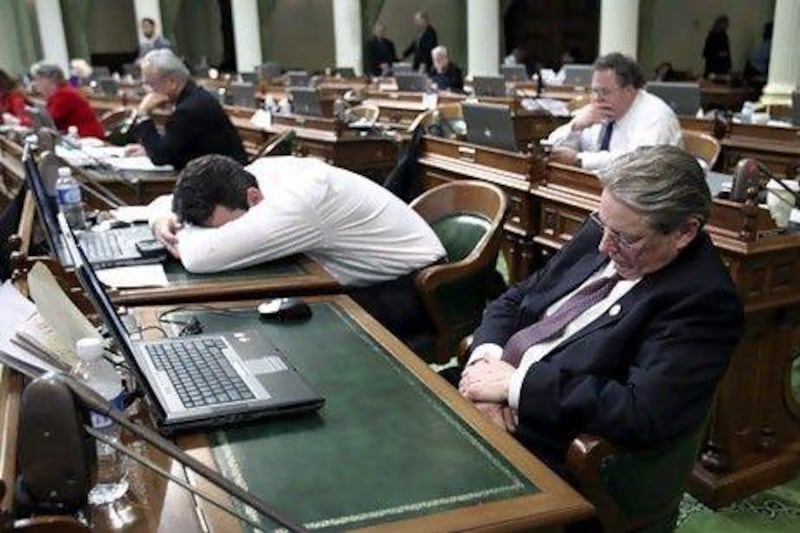The sun is blazing and the office is cold and quiet. It is just 1pm, but you simply cannot stop thinking about the good afternoon nap and how much you need it. You dream of laying your head down on the cold desk and dozing off for a short break without anyone looking at you in a funny way or disturbing your peace.
Tomorrow's exclusives tonight:
Industry Insights e-newsletter Stay ahead of the pack and get the pick of the premium Business content straight to your inbox. Sign up
Most of us would resist this temptation, fearing that we would be labelled as lazy and unproductive, but mainly because we are afraid it might get us fired, especially during these tough economic times.
Contrary to popular opinion, napping is not for the lazy or depressed. Winston Churchill and Albert Einstein were famous nap-takers. And the list includes Bill Clinton.
Talking about napping is a staple in my daily routine.
Aiming to kick-start my day in a positive manner, I log in to my Twitter account in anticipation of reading some inspirational quotes to help my productivity.
Instead, almost every student, associate or engineer on my list is complaining about a lack of sleep. They long for their pillows, or are counting the days till the weekend. Some would even skip lunch, believing it adds to their fatigue and drowsiness.
Others, like my aunt's colleagues, would actually nap at work, mainly during the afternoon hours when everyone is out for lunch or prayers.
"They would close the office doors, put on their sunglasses, and lay back on their armchair for a while. Or they would go to the prayer room and nap for a good 20 minutes," she says.
There was a time when napping on the job could get someone fired. If someone was in the military in war, he could be shot.
Nowadays, many leading industries and companies have a different take on the whole napping issue and are encouraging their employees to sleep a bit during business hours.
Why the change?
One of the reasons is the growing recognition of how costly it is for businesses when their employees are sleep-deprived.
The costs includereduced productivity, increased drug use, and more errors and accidents.
The National Sleep Foundation, an American non-profit organisation, estimates the annual cost of worker exhaustion in the US to be about US$100 billion (Dh367.32bn) in lost productivity, health expenses and employee absences.
But could napping at work actually increase productivity? A study by the US space agency NASA reveals that taking a nap increases performance by as much as 34 per cent.
Other studies found that napping improves alertness, learning and cognition.
For police officers, doctors and others serving safety-sensitive jobs, alertness can make a difference between life and death. Taking naps is crucial in their case.
But what is the ideal length of a nap? Researchers found that a 20-minute snooze - known as power nap - has a benefit similar to that of nighttime sleep and does not disrupt the night-time schedule, unless an individual suffers from insomnia.
More and more leading worldwide organisations have incorporated napping periods for employees.
Nike has provided its employees with quiet rooms for naps or meditation. Google has a number of napping pods throughout its main campus.
Airlines are no exception.
They allow members of the cockpit crew to sleep during long international flights as their colleagues assume control. Jawa, a mobile technology company in Arizona, has two resting rooms for programmers who work long, exhausting hours.
The ideal napping time is between 1pm and 3pm, as studies reveal that the mini-dip in energy people experience between these times is biological and not because they just had lunch.
While beneficial, napping at work also has its downsides.
For instance, if an employee has been up all night or had only a few hours of sleep, a nap could cause a hangover effect known as "sleep inertia". In addition, a napping policy may also cause employees to feel pressured into staying longer at work.
With more and more companies in the UAE now operating for more than eight working hours per day, integrating napping hours is not a bad idea.
Implementing the policy at the office is not something that would be done overnight, however. But there are ways to make it possible.
While some western companies have taken extensive measures such as building sleeping pods or cubicles, others provide simpler solutions, which could work for many offices in the UAE.
Organisations could dedicate empty rooms with soft couches where employees could take naps. Or they could follow the example of Dubai's courts, which have provided stressed employees with massage chairs.
The more I look into this, the more I realise that we are a sleep-deprived and night-oriented nation. With our culture revolving around night-time social activities, it would be no surprise if this trend continues, and over time it would harm the economy.
So it really comes down to this: when employees snooze, the economy gains. Not a bad trade-off.
* Manar Al Hinai is a fashion designer and writer. You can follow her on Twitter @manar_alhinai
twitter: Follow and share our breaking business news. Follow us





